Hi tribe! I hope you all are having such a great day today! Can you believe we’re in March? A couple of weeks ago, I was in Texas shivering during the power outages, but now, I’m finally getting a taste of spring — I hope you are too!
Since we’re entering spring soon, you’ll be hearing some exciting springtime skincare tips you can apply as the months change from cold to warm. These seasonal changes affect our skin, so it’s important that we adjust our skincare regimen accordingly.
But today, we’ll be talking about something that’s relevant in skincare 24/7 — the Holy Grail of Healthy Skin — A.K.A. collagen.
You may have heard me mention collagen on other episodes, but today, we’re dedicating a whole episode to this beautiful protein. First, we’ll discuss what it actually means and its uses. Second, we’ll talk about what causes collagen depletion in the skin. Third, I’ll explain the three ingredients your skin needs for collagen production. And lastly, we’ll end with some practical ways and tips you can stimulate collagen production yourself!
This episode is jam-packed with useful information about one of the top pillars of skincare success. Without collagen production, our skin is much less healthy and prone to damage. It doesn’t matter how old or young you are — wherever you are in your life, you need collagen to have the glowing skin you deserve! Let’s get started, tribe.
First, What Is Collagen?
Collagen is one of the hottest topics in the world of beauty and wellness right now. If you go into any drugstore near you, you’ll find all types of products — from serums to lipsticks to gummy bears — that contain collagen. But is it worth all the hype?
Actually, yes! Collagen is literally a wrinkle-fighting protein, and it’s one of the most abundant proteins in the body. You can think of collagen as the glue that holds your body together, including tendons, ligaments, bones, muscles, and skin. Collagen provides both strength and elasticity to your skin, making it plump and youthful. What’s more, collagen supports cell-turnover, meaning that it helps your dead skin cells shed naturally, preparing the way for new, healthy skin to take its place.
What Causes Collagen Depletion in the Skin?
Now, you may be thinking — if collagen is one of the most plentiful proteins in the body, why do I need more? Unfortunately, two primary factors contribute to collagen depletion.
#1: Aging
As you age, collagen levels in the body start decreasing. This begins in your mid-20s, and there are studies showing that collagen production decreases by about 1% each year starting at age 25. Collagen depletion results in sagging skin, the appearance of wrinkles, and fine lines.
Not only do we have lower collagen levels as we age, but we also have our skin cells dividing at a much slower rate. The top layer of our skin — the epidermis — becomes thin and loses moisture over time due to the slower production of new cells.
#2. Sun Damage
Repetitive sun damage can also severely damage the amount of collagen production in your skin. Thankfully, there’s an easy preventive measure for this, and I think you know the answer.
That’s right — sunscreen. Tribe — I cannot emphasize this enough — wear sunscreen every day, whether you’re inside, outside, in the middle of winter, or driving your car throughout town! Harmful UV rays can damage your skin through windows and even if it’s cloudy, so make sure to wear sunscreen every day to ensure your collagen levels are staying healthy!
What Is Collagen Stimulation and What Ingredients Increase It in Our Skin?
Now that we know the two main factors causing collagen depletion, what are some ways we can increase collagen stimulation?
While we can’t keep ourselves from growing older, there are some ingredients we can use on our skin to help with collagen production. These ingredients aren’t just “trending topics” — they are scientifically proven by dermatologists and other researchers to help with collagen stimulation.
#1: Retinoids
If you tuned into Episode #33 and Episode #34, you already know the basics of retinoids, what they are, and what they do! They can help with hyperpigmentation, diminish acne, and also help with collagen stimulation.
Retinoids stimulate fibroblast cells in the second layer of the skin, which is called the dermis. Once stimulated by the retinoids, these fibroblast cells make little fibers of collagen that run within the dermis, increasing the amount of collagen in your skin while also removing old elastin fibers, giving your skin improved elasticity.
To put it simply, retinoids increase the rate at which new skin cells replace old ones, which is GREAT news for anyone looking to have soft, plump skin as they age!
To learn more about retinoids and whether you should talk to your dermatologist about a prescription, check out the Beginner’s Guide to Retinoids blog and the Q&A Retinoid blog. I also give some product recommendations!
#2: Vitamin C
Vitamin C, also known as ascorbic acid, is scientifically known to increase collagen stimulation as well!
Vitamin C is essential for producing stable collagen in the skin, and it does this through an enzyme called lysyl hydroxylase, which is necessary for the cross-linking of these collagen molecules in the dermis. Why is the cross-linking of these collagen molecules so important? It’s actually what achieves that plump look of healthy skin! This reaction caused by ascorbic acid also happens in wound healing, so it’s important to make sure your skincare products contain Vitamin C to ensure your skin stays healthy and, if damaged, heal quickly.
#3: Alpha Hydroxy Acids
The third ingredient backed by scientific evidence to help with collagen stimulation is alpha hydroxy acids. I mentioned these back in Episode #25 when I talked about the skincare success framework and on Episode #26 on how to determine your skin type.
The main alpha hydroxy acids you need to know are glycolic acid, lactic acid, and mandelic acid. Basically what these acids do is stimulate the exfoliation of the top layers of your skin, especially the epidermal cells in the stratum corneum, by interfering with the ionic bonding between these cells. In other words, what happens is your dull and rough skin starts to slough off, which promotes cellular renewal.
These alpha hydroxy acids improve skin proliferation, thickness, and restore hydration as well by increasing hyaluronic acid production — leading to plumper skin with fewer wrinkles and fine lines.
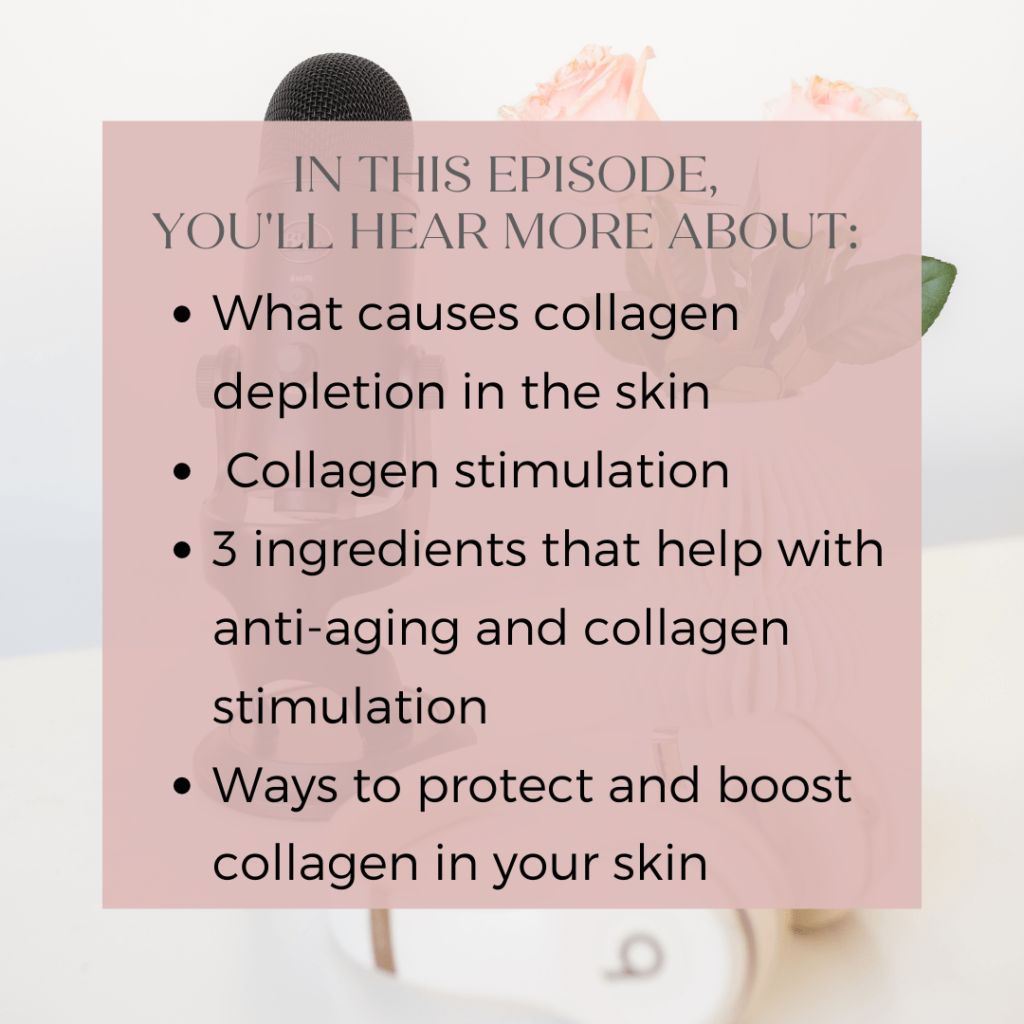
The Skincare Success Framework for Collagen Stimulation
Now that I’ve explained the science behind these ingredients, it’s time to learn how we can actually use them in our daily skincare success regimen! First of all, if you’re reading this, know that you’re in excellent hands with my healthy skin community. With the right skincare practices, you can protect your existing collagen as well as boost the production of collagen in your skin.
#1: Wear Sunscreen
I will preach this until the day I die — we all need to wear sunscreen (at least 30 SPF) every single day to protect our skin from photoaging. Sun accelerates the breakdown of those collagen fibers, which form wrinkles. I actually look at this under the microscope every single day, and trust me — it doesn’t look good, so please do yourself and your skin a favor and wear your sunscreen!
#2: Add a Retinol or Retinoid to Your Skincare Routine
If you need a refresher on retinol and retinoids, make sure to listen to Episode #33 and #34, and check out the blogs as well!
To sum up, retinoids and retinols stimulate your collagen production and help with skin cell turnover, which improves your skin tone and texture. They can also even decrease your pore size. You can find retinols (basically a weaker form of retinoids) in over-the-counter products, such as RoC’s Retinol Correxion Deep Wrinkle Night Cream (which is one of my favorites). However, if you want to use a retinoid, you should talk to your dermatologist and ask about a prescription.
Another important note: If you’re pregnant and or planning to conceive, it is NOT recommended to use a topical retinol or retinoid. There are some alternatives you can use, such as Bakuchiols. Bakuchiols are essentially a plant-based alternative to retinols, which I’ll discuss in a future episode.
#3: Antioxidant Serum / Moisturizer
Either one of these products is a great way to prevent collagen depletion and stimulate collagen production. I talked about these more in the skin success framework, but essentially what they do is protect your skin from free radical damage.
Every morning before I put on my sunscreen, I always apply my Vitamin C antioxidant to my face. I love SkinCeuticals C E Ferulic, and their Phloretin CF works well if your skin is more acne-prone.
#4: Drink More Water
Staying hydrated is a great way to boost and protect collagen in your skin. When your skin isn’t properly hydrated, it’s dry, and the collagen is not able to repair itself. Of course, you need to abide by all of these steps in this section to increase collagen production (drinking water by itself won’t take your wrinkles away), but it’s an important step you can’t forget!
#5: Invest in a Peptide Cream
If a peptide cream isn’t in your budget, you can still have healthy collagen production without it; however, if it is within your budget, I highly suggest investing in one to give your collagen that extra boost. Peptide creams and serums are known to stimulate collagen and elastin in the skin, improving skin tone, laxity, and firmness.
I love Revision Skincare’s Nectifirm® Advanced which decreases the number of fine lines and wrinkles on the neck, and another great one is Alastin’s Restorative Skin Complex.
#6: Try In-Office Dermatologist Treatments
Lastly, you can always go to your dermatologist and try in-office treatments to stimulate collagen production, such as chemical peels to increase cell turnover. Certain lasers can also help regenerate collagen in the skin, as well as micro-needling and other treatments.
If you don’t currently have a dermatologist, you can find one here!
Congrats! You’ve Found the Holy Grail of Skincare!
There you have it, tribe! I was so excited to talk about the Holy Grail of Skincare — collagen — because it is such a hot topic right now, especially with anti-aging. In order to make empowered decisions about your skincare regimen, understanding the basics of collagen stimulation and depletion are a MUST. I am so grateful that I could provide that information for you today!
If you enjoyed this episode, be sure to let me know on Instagram! You can tag me, @drnikoleta, with a screenshot of the episode and your greatest takeaways. I’d also really appreciate it if you would subscribe and leave a five-star rating on Apple Podcasts — that helps us share the podcast with wonderful people like you who deserve the skin of their dreams!
Lastly, if you want to get connected in this mindful skincare space, check out the podcast Facebook Community! This is an exclusive group of like-minded individuals who prioritize skincare, self-care, and healthcare — we’d love to have you join us!
Until next time, Step Out with Confidence®, love your skin, and show up boldly in life and business so you can shine so bright with that beautiful skin of yours. Until next time!

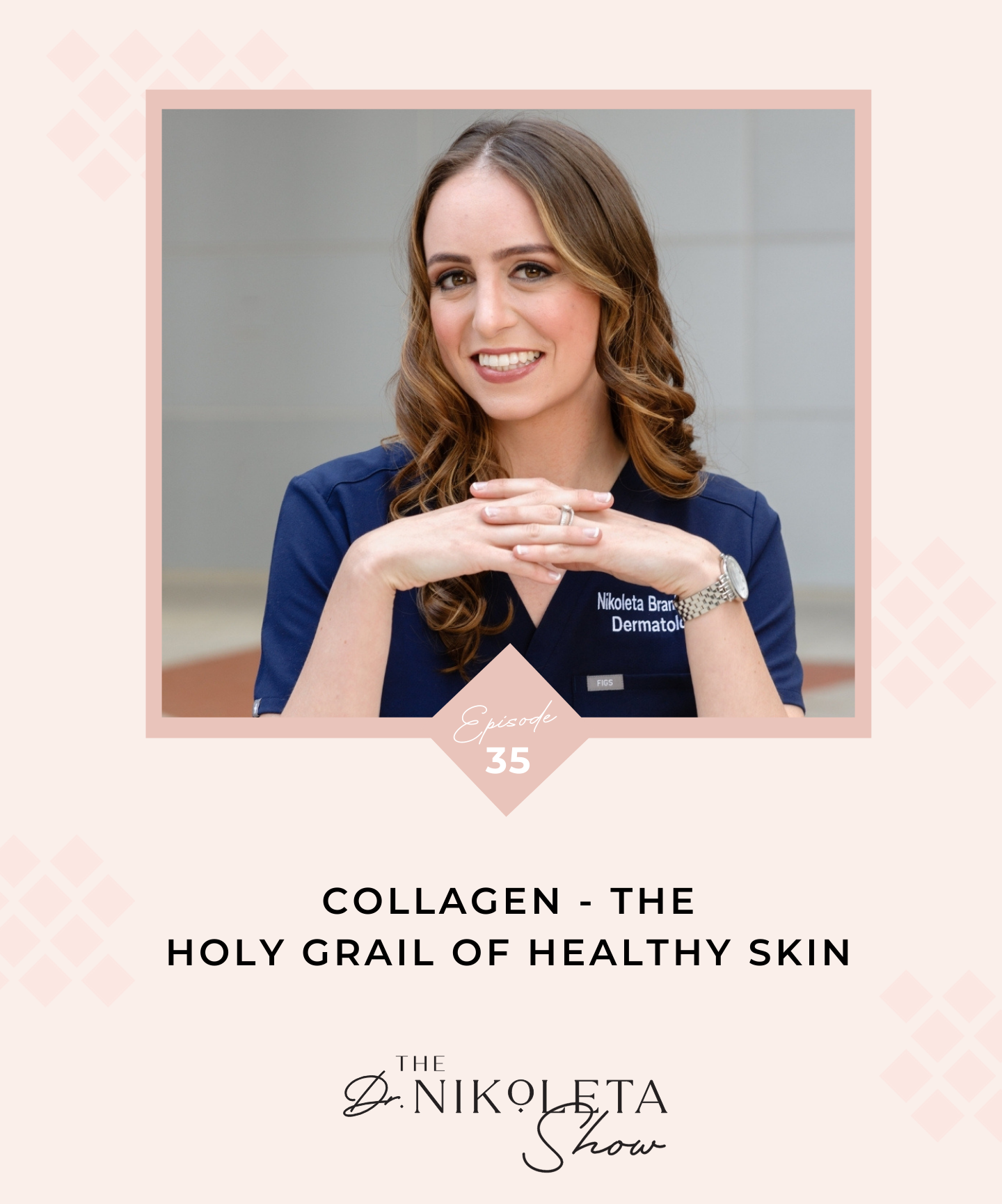

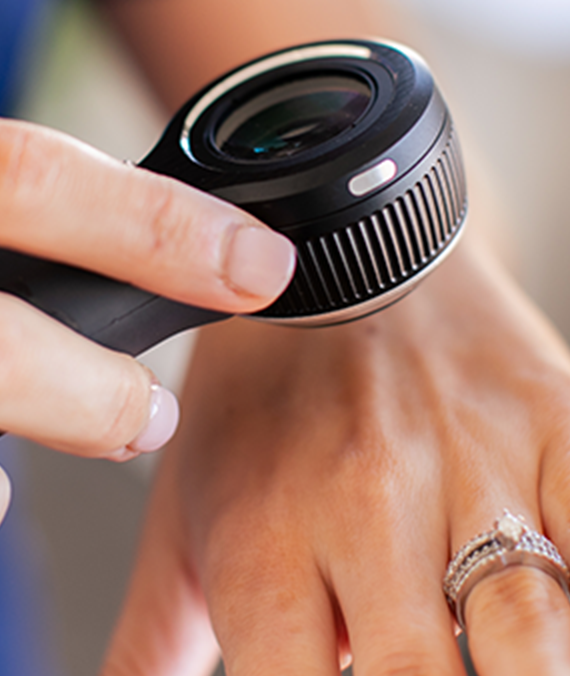

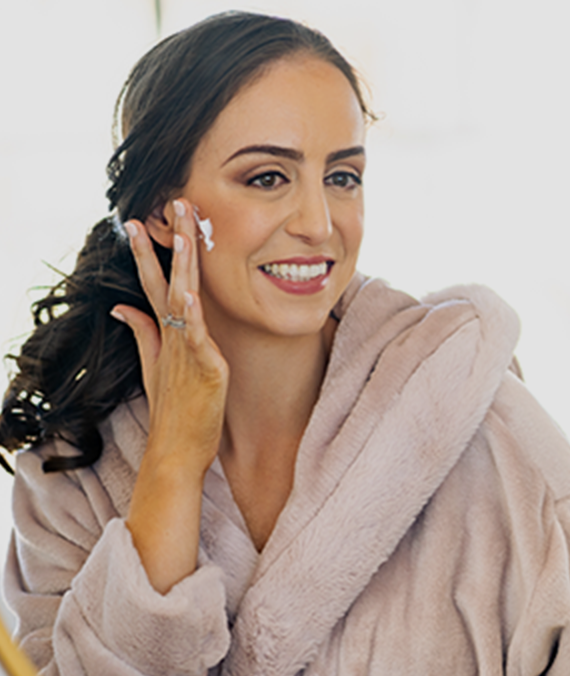
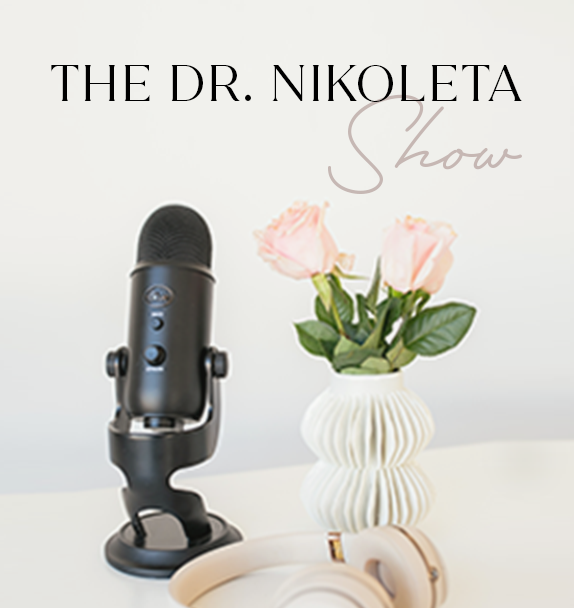
Stay in the know
Dropping in with weekly self-love affirmations, inspo, and skin secrets from Dr. Nikoleta created with YOU in mind.